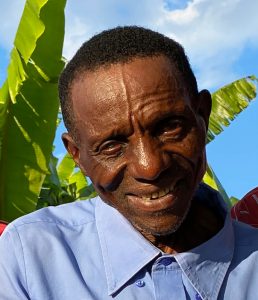Introduction
Friday Chamunorwa is known internationally through his mbira recordings, his top quality hosho rattles distributed by MBIRA worldwide, and visitors to his village. He is also known in his rural area by his totem (Shumba) Mhazi and a family nickname Bhakuza.
Recordings Available From MBIRA
Use the links and listen to samples of Friday Chamunorwa’s albums, both solo and with his mbira group Dzimba ReShumba.
- 3667 Dzimba ReShumba Mbira Group 2022
- 3422 Friday Chamunorwa – Nyamaropa Tuning 2003
- 3335 Friday Chamunorwa 22 April 2001 – Nyamaropa Tuning Mbira & Vocals (with Hosho)
Video
This is a 2022 video of Friday Chamunorwa’s extended family and friends dancing to the music of his Dzimba ReShumba mbira group after they finished recording their 2022 album (he’s the center mbira player).
Biography
(based on a 2003 interview by Denver Banda, edited and updated by Erica Azim)
Early Musical Experiences
Friday worked on a commercial farm from the age of 7 (1959), and by age 9 was playing the banjo and pennywhistle, which were popular then as farm entertainment. He performed for the farm workers with a relative for a while, but then his grandfather broke the two instruments, saying that he feared they would corrupt Friday’s mind. The experience left young Mhazi troubled for some time.
In 1965, when he was 13, Friday resourcefully took an empty can of jam and added wire keys to it, which he plucked and tuned to the sounds familiar to him from the pennywhistle. In the same year, the Chamunorwa family moved to a village in Mhondoro adjacent to the commercial farms.
First Mbira and Bira Experiences
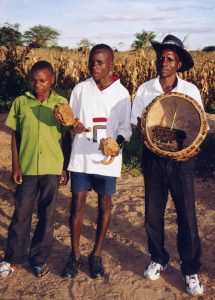
In Mhondoro, Friday met real mbira – much more complex than his jam can instrument and eye-opening for the young musician. Mhazi met virtuoso musician Jonah Gondo at a Muriritirwa village bira ceremony in 1966. Gondo, seeing Friday’s interest and potential, convinced the teenage boy to leave his makeshift instrument and learn to play traditional mbira.
Gondo was a very patient teacher and began to teach young Friday Kariga mombe. He was so impressed with his student’s serious effort that he gave one of his own three mbiras to Friday and continued to teach him. Chamunorwa attributes his youthful eagerness to the happenings he had seen when the music was played in bira ceremonies. He wanted to achieve those effects with his mbira playing too.
Chisi (a traditional day of rest) took place on different days in Gondo’s and Friday’s villages. When it was chisi for his village, Mhazi would go to his teacher’s place to learn and his teacher would come to him during the other village’s chisi.
Starting to Play Mbira at Ceremonies
Gondo had been playing solo, but at age 17 Mhazi’s playing was ready for the ears of the spirits as Gondo’s mbira partner. They now played in bira ceremonies together. Chamunorwa says that he has seen and learned a lot from the ceremonies he has attended:
“Gwenyambiras are some of the most knowledgeable when it comes to culture because they see and hear an earful in their playing business.”
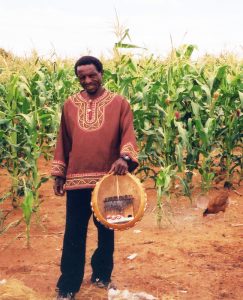
Difficult Times
Chamunorwa suffered when his teacher Gondo became mentally ill in 1975. His mentor’s virtuosity vanished and he was no longer able to play music. Accustomed to playing the kushaura part, now Mhazi had to cope with playing solo, incorporating both parts and including the vocals.
The solo playing was taxing and Chamunorwa was usually paid only $3 for an all night ceremony, out of which he had to pay the hosho player. Hardships forced him to take a job at a construction company and then on a commercial farm, where he supplemented his paltry wages with mbira performances on the farm and in surrounding areas.
After losing the job due to health issues ascribed to witchcraft, Mhazi recovered with the aid of a spirit medium and plenty of mbira playing. This increased his respect for mbira even more.
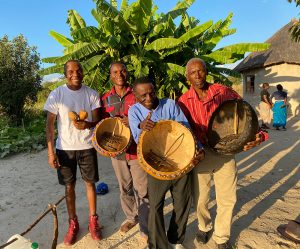
Unemployed and with a family to feed, Chamunorwa played mbira for survival in many Mhondoro villages and in Chitungwiza. When not playing at ceremonies, he did his own subsistence farming and helped in the fields of others for pay, including neighbor Joshua Magaya (father of Cosmas).
Mhazi has faced many hardships, including cattle dying of diseases and being given land by the government that was then taken away by people with more connections. Chamunorwa says his consolation has been the soothing sound of the mbira, which he says he listens to “when poverty bites.”
Over the years, Mhazi says many people have been prejudiced regarding his situation. He says they viewed him as a nonentity in society and stigmatized him because of his mentally ill teacher Gondo (who passed away in 2000).
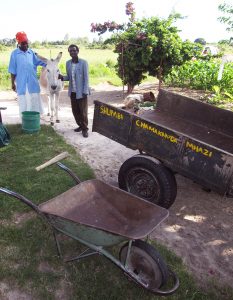
Being a Gwenyambira
Chamunorwa explains that playing mbira for the ancestors is the driving force behind him, and says:
“If one is a gwenyambira, he has to play for the people. If one is invited, he has to play what his hosts want him to. Mbira players are for the people and selfishness is not allowed. One acts as the intermediary for the hosts and their ancestors.”
Mhazi recalls a ceremony in the Rwizi area of Mhondoro where the possessed spirit medium dug a hole with his bare hands and filled it with nearly 20 liters of water. When the tempo of Chamunorwa’s music increased, the medium started to gulp down most of the hole’s contents. Mhazi says he eagerly awaits the next bira in the community, for it is a time to learn aspects of the spirit world as manifested among the living and communicated to them.
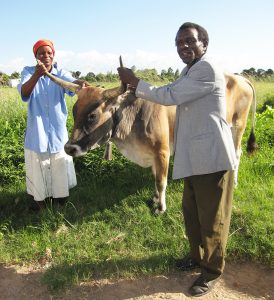
Chamunorwa has no particular favorite song and explains this by stating that different spirits like different songs and he only acts as a catalyst in bringing them through the music they need from him. In his singing, he balances the high soulful huro style with the lower mahonyera. His lyrics are mostly a prayer to the spirits, asking for protection and prosperity.
Making Mbiras
In 1985, Chamunorwa started making mbira instruments and selling them very cheaply to people nearby. He says the ancestors are the owners of the music, not him, so he can’t measure a value that can equal the ancestors monetarily.
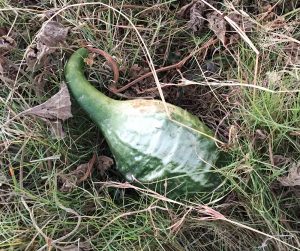
Forming His First Mbira Group
In the late 1980’s, Chamunorwa began to play with his nephew, mbira prodigy Simon Hoto. He also taught his son Brian to play and the trio was popular in the area.
Mhazi has also played with more widely known musicians such as Luken Pasipamire Kwari and Cosmas Magaya.
Teaching Mbira
Chamunorwa taught mbira to his sons and many other young musicians in the Mhondoro area, with as much patience as his mentor Gondo showed him. Besides his sons, his students include Mudavanhu Magaya, Denver Banda and Kudakwashe Sikalela.
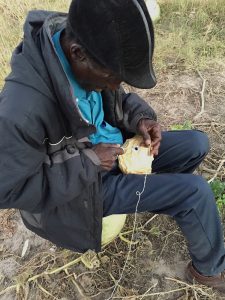
Messages to Mbira Students
Mhazi’s most important messages to those who want to learn mbira are: stick to what you were originally taught, fear and honor the sacred instrument, and do not mix it with pop music. Chamunorwa says that if you do mix it with pop styles then it’s no longer mbira.
Making Popular Instruments Now
As well as growing food for his family, Chamunorwa currently grows gourds and makes excellent hosho rattles and natural deze resonators from them. MBIRA has been selling his hosho for many years, so if you bought hosho with white string closure from mbira.org, he was likely the maker!
Recording Experiences
MBIRA recorded Friday Chamunorwa playing solo in 2001 (with his young son playing hosho) and in 2003. He used the proceeds of those recordings to buy important items for his family, including a donkey, cow, wheelbarrow and large wagon.
Watch for the December 2022 release of the excellent album by his current family mbira group Dzimba ReShumba.
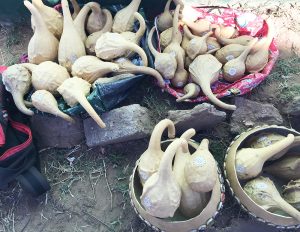
Early Life
Born in 1952, Friday Chamunorwa’s early life was spent on commercial farms in the Charter Estates region. As the second in a family of 5 boys and 3 girls, life was tough on the farms and at the age of seven he was already working in the tobacco nurseries. Mhazi could only attend school on the farm through first grade, partly because his family needed him to work more. He says this was also because the Rhodesian government feared that educated Africans would be difficult to control when the whites needed cheap labor, so made education difficult for non-whites to access.

